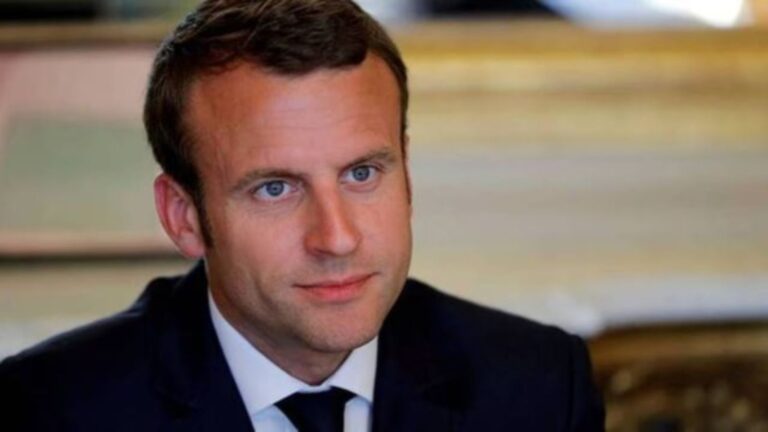The anti-immigration Rally National (RN) party won the first round of parliamentary elections on Sunday, bringing France the closest it has come to a far-right government since World War II, according to exit polls.
President Emmanuel Macron dissolved Parliament and called elections following the crushing defeat of his centrist coalition Together at the hands of the RN in the European Parliamentary elections.
Macron will remain president after the second round of parliamentary elections on July 7, but he must choose a prime minister from the party or coalition with the most seats in the National Assembly, no matter how different those policies might be from his own.
Whether the RN can take power next week will depend on whether its rivals unite in the coming days to keep it out of power. The RN may become the largest party, but it is unlikely to win an absolute majority.
The party’s key players in this election campaign are:
Jordan Bardella of the far-right National Rally Party
Jordan Bardella, a smartly suited 28-year-old, is of Italian descent and was raised by his mother in a poor council estate in the northern suburbs of Paris, but went to a semi-private Catholic school.
His working-class origins are a selling point: “I went into politics because of all the experiences I had there,” he told Le Monde.
Bardella joined Marine Le Pen’s far-right party at the age of 16. Seven years later, Le Pen chose him to lead the party in the 2019 European elections. Party members elected him as leader in November 2022.
The veteran Le Pen and the wiry young Bardella make a formidable political tag team, with Bardella using his TikTok account, which has 1.7 million followers, to drum up support among young voters.
The two men expanded the party’s base beyond its historical strongholds in the Mediterranean and northern Rust Belt, pitching it as the defender of family incomes, jobs and French identity.
Mr Bardella has cast himself as a “purchasing power prime minister” and has pledged to cut value-added taxes on electricity and fuel and abolish income tax for those under 30. Opponents say he entered politics too young, lacks work experience and has unrealistic economic plans.
Gabriel Attal, centrist “Together” alliance
Gabriel Attal, 35, was appointed by President Macron in January to become France’s youngest post-war prime minister.
Attal, sometimes called “Baby Macron”, faces the daunting task of saving his boss’ presidency and political movement.
Macron is often seen as arrogant and out of touch with everyday hardships, and disgruntled voters across the country are angered by his policies and personality and are shifting their support to the far right and a new left-wing coalition.
Attal is France’s first openly gay prime minister.
His political rise under Macron has been remarkable, joining the Socialist party at age 17 and becoming a household name in French politics after being appointed government spokesman during the coronavirus pandemic.
Attal later served as budget minister and then head of the education ministry for several months before Macron appointed him head of government in a bid to oust the far-right.
Atal’s first act upon assuming the education minister position in 2023 was to ban the wearing of the abaya, a traditional Muslim robe, in public schools, making him popular among conservative voters despite his left-leaning background.
Left-wing figures
With no clear candidate for the prime ministerial position on the left, a broad range of parties are joining forces to form the New Popular Front (NFP) to challenge the RN.
The NFP has not revealed who it will choose as prime minister. Here are some of the NFP’s most prominent names:
Jean-Luc Mélenchon: France’s far-left party will not give in
Jean-Luc Mélenchon, 72, has been a key figure in French left-wing politics for decades and served as a minister in previous governments as a Socialist.
He ran for president in 2012, 2017 and 2022, improving his score each time. In the 2022 election, he came in third behind far-right leader Marine Le Pen. Macron won that election.
A fiery orator, Mr. Mélenchon is one of the most controversial figures in French politics, exciting and terrifying voters with his unbridled tax and spending proposals, class war rhetoric and controversial foreign policy positions, particularly on Gaza. Critics have accused him of anti-Semitism, which Mr. Mélenchon denies.
Rafael Guksmann, Socialist Party
Raphaël Glucksmann, 44, topped the Socialist Party’s list of candidates in early June’s European Parliament elections, which won nearly 14% of the vote, just behind Macron’s Together group, in what was seen as a sign of resurgence for a party that has governed France for decades but has been forgotten in recent electoral battles.
Glucksmann attended a prestigious school and enjoyed a diverse career in journalism and broadcasting, including serving as an adviser to the then Georgian President Mikheil Saakashvili.
He advocates strong European support for Ukraine in resisting Russian aggression.
Laurent Berger, former CFDT trade union leader
Laurent Bergé, 55, is the former head of the moderate CFDT, one of France’s main trade unions, and has a history of being a vocal opponent of the RN.
Berger has said he does not want to be prime minister, but those on the left are promoting him as a symbol of unity and a potentially popular alternative to Melenchon.

